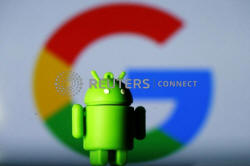|
The shorthanded court, down one justice following the death of
Ruth Bader Ginsburg last month, is scheduled to hear oral
arguments in Google's appeal of a lower court ruling reviving
the lawsuit in which Oracle has sought at least $8 billion in
damages. The arguments will be held by teleconference because of
the coronavirus pandemic.
A jury cleared Google in 2016, but the U.S. Court of Appeals for
the Federal Circuit overturned that decision in 2018, finding
that Google's inclusion of Oracle's software code in Android was
not permissible under U.S. copyright law.
Oracle and Google, two California-based technology giants with
combined annual revenues of more than $190 billion, have been
feuding since Oracle sued for copyright infringement in 2010 in
federal court in San Francisco. The case's outcome will help
determine the level of copyright protection for software,
according to intellectual property lawyers.
Oracle accused Google of copying thousands of lines of computer
code from its popular Java programming language without a
license in order to make Android, a competing platform that has
harmed Oracle's business.
Google has said the shortcut commands it copied into Android do
not warrant copyright protection because they help developers
write programs to work across platforms, a key to software
innovation.
Even if the commands can be copyrighted, Google has said, its
use of them was permissible under the "fair use" defense to
copyright infringement, which can protect copying that
transforms an original copyrighted work. Google has argued that
its copying was "undoubtedly transformative" because it resulted
in "an entirely new smartphone platform."
The Federal Circuit in 2018 rejected Google's defense, saying "a
mere change in format (e.g., from desktop and laptop computers
to smartphones and tablets) is insufficient as a matter of law
to qualify as a transformative use."
Oracle will recalculate its damages request if it wins at the
Supreme Court and the case is sent back to a lower court, Oracle
General Counsel Dorian Daley said in an interview. The
compensation request would exceed the roughly $8 billion Oracle
previously demanded, Daley added.
President Donald Trump's administration backed Oracle in the
case, previously urging the justices to turn away Google's
appeal.
The Supreme Court originally scheduled the argument for March
but postponed it due to the pandemic.
The court has eight justices rather than its full complement of
nine. President Donald Trump has asked the U.S. Senate to
confirm Amy Coney Barrett, his nominee to replace Ginsburg, by
the Nov. 3 U.S. election.
(Reporting by Jan Wolfe; Editing by Will Dunham)
[© 2020 Thomson Reuters. All rights
reserved.] Copyright 2020 Reuters. All rights reserved. This material may not be published,
broadcast, rewritten or redistributed.
Thompson Reuters is solely responsible for this content.

|
|





